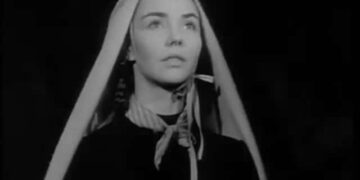Agatha Christie, the renowned queen of mystery, captivated readers with her masterpiece, ‘The Witness for the Prosecution.’ This iconic story has not only been immortalized on the pages of a book but has also been brought to life on the small screen in a TV series adaptation. In this article, we will delve into the intriguing differences between the book and the TV series, exploring the various elements that make each version unique and captivating.
Book Summary of ‘The Witness for the Prosecution’
‘The Witness for the Prosecution’ takes readers on a thrilling journey through the British legal system. The story revolves around Leonard Vole, a charming young man accused of murdering the wealthy Emily French. As the courtroom drama unfolds, the plot thickens with unexpected twists and turns. The book masterfully combines suspense, deception, and an exploration of the human psyche, leaving readers on the edge of their seats until the very last page.
TV Series Summary of ‘The Witness for the Prosecution’
The TV series adaptation of ‘The Witness for the Prosecution’ brings the gripping tale to life with its visual storytelling and stellar performances. Set in the 1920s, the series meticulously recreates the atmosphere of the era, immersing viewers in a world of glamour, intrigue, and suspense. The intricate plot remains faithful to Christie’s original story, while also adding its own unique elements to keep audiences guessing until the final revelation. The TV series expands upon the book’s narrative, allowing viewers to experience the story from a fresh perspective.
Exploring the Intriguing Differences between the Book and TV Series Adaptation
Where and When is the Setting Timeline for ‘The Witness for the Prosecution’?
Both the book and the TV series are set in 1920s London, a time of post-war reconstruction and societal change. However, the TV series provides a more detailed and visually immersive portrayal of the era, capturing the essence of the time period with its meticulous attention to set design, costumes, and cinematography. The book, on the other hand, allows readers to use their imagination to envision the setting, relying on Christie’s vivid descriptions and their own interpretation.
Who’s Who in ‘The Witness for the Prosecution’ – Main Characters and Their Roles
‘The Witness for the Prosecution’ introduces readers and viewers to a cast of intriguing characters, each with their own secrets and motivations. Leonard Vole, the accused, is a complex character who elicits both sympathy and suspicion. Emily French, the victim, is portrayed as a cunning and manipulative woman. Other key characters include Sir Wilfrid Robarts, Leonard’s defense barrister, and Romaine, Leonard’s enigmatic wife. While the book and the TV series present these characters in a similar light, the visual medium of the TV series allows for a more nuanced portrayal, with actors breathing life into the characters and adding depth to their personalities.
Guest Stars in the TV Series Adaptation of ‘The Witness for the Prosecution’
The TV series adaptation of ‘The Witness for the Prosecution’ features an array of talented guest stars, adding an extra layer of intrigue and excitement. Esteemed actors and actresses bring their unique interpretations to the supporting characters, enriching the overall viewing experience. From renowned veterans to rising stars, the guest stars infuse the series with their own charisma and talent, making the adaptation a memorable ensemble performance.
Memorable Quotes from ‘The Witness for the Prosecution’
Both the book and the TV series are filled with memorable quotes that capture the essence of the story and its characters. These quotes range from thought-provoking insights into human nature to suspenseful exchanges that keep readers and viewers on edge. Here are a few examples:
- “It is a curious thought, but it is only when you see people looking ridiculous that you realize just how much you love them.” – Agatha Christie, ‘The Witness for the Prosecution’
- “Everyone has something to hide, don’t they? The trick is to find out what.” – TV Series, ‘The Witness for the Prosecution’
These quotes showcase the brilliance of Christie’s writing and the ability of the TV series to capture the essence of her words.
Soundtrack by Paul Englishby – The Music that Brings the Story to Life
The TV series adaptation of ‘The Witness for the Prosecution’ is enhanced by a captivating soundtrack composed by Paul Englishby. The music serves as a powerful tool to create atmosphere and evoke emotions. From suspenseful orchestral arrangements to poignant piano melodies, Englishby’s score elevates the viewing experience, immersing viewers in the world of the story and heightening the tension.
Tips for Cosplay and Dressing Up like the Characters of ‘The Witness for the Prosecution’
Fans of ‘The Witness for the Prosecution’ often find themselves captivated not only by the story but also by the captivating fashion of the 1920s. If you’re looking to channel the style of the characters, here are some tips for cosplay and dressing up like Leonard Vole and Emily French:
- Leonard Vole: Embrace the dapper gentleman look with a tailored suit, a fedora hat, and polished Oxford shoes.
- Emily French: Exude glamour with a beaded flapper dress, a feather headband, and long strands of pearls.
By embracing the fashion of the era, you can bring the characters to life in your own unique way.
Agatha Christie – A Bio and List of Her 5 Best Works
Agatha Christie, the brilliant mind behind ‘The Witness for the Prosecution,’ is one of the most celebrated authors in the mystery genre. Born in 1890 in Devon, England, Christie’s captivating storytelling and intricate plots have made her a literary icon. Here are five of her best works, showcasing her unparalleled talent:
- ‘Murder on the Orient Express’
- ‘And Then There Were None’
- ‘Death on the Nile’
- ‘The Murder of Roger Ackroyd’
- ‘The ABC Murders’
Each of these novels is a testament to Christie’s mastery of suspense and her ability to keep readers guessing until the very end.
Other Media Adaptations by Sarah Phelps – A List and Description of 5 Other Works
Sarah Phelps, the talented screenwriter behind the TV series adaptation of ‘The Witness for the Prosecution,’ has also brought several other Agatha Christie stories to life. Here are five other media adaptations by Sarah Phelps that are worth exploring:
- ‘Ordeal by Innocence’
- ‘The Pale Horse’
- ‘And Then There Were None’
- ‘The ABC Murders’
- ‘The Secret Adversary’
Phelps’s adaptations have garnered critical acclaim for their fresh take on Christie’s timeless mysteries, making them a must-watch for fans of the genre.
10 Similar Movies and Books to ‘The Witness for the Prosecution’
If you enjoyed the suspenseful twists and turns of ‘The Witness for the Prosecution,’ here are ten similar movies and books that are sure to captivate you:
- ‘A Few Good Men’ (1992, film)
- ‘Presumed Innocent’ by Scott Turow (book)
- ‘Primal Fear’ (1996, film)
- ‘Gone Girl’ by Gillian Flynn (book)
- ‘The Lincoln Lawyer’ (2011, film)
- ‘Defending Jacob’ by William Landay (book)
- ‘The Girl with the Dragon Tattoo’ (2009, film)
- ‘The Pelican Brief’ by John Grisham (book)
- ‘Doubt’ (2008, film)
- ‘The Talented Mr. Ripley’ by Patricia Highsmith (book)
These gripping stories share themes of deception, courtroom drama, and unexpected plot twists, providing a similar thrill to ‘The Witness for the Prosecution.’
Book Club Questions for ‘The Witness for the Prosecution’
‘The Witness for the Prosecution’ is a compelling choice for book clubs, offering rich discussion topics. Here are some book club questions to spark conversations and delve deeper into the story:
- Did you find Leonard Vole’s character sympathetic or suspicious? Why?
- How did the courtroom scenes contribute to the suspense and tension of the story?
- Were you surprised by the final revelation? Did you see it coming?
- How does Agatha Christie explore the theme of deception in the novel?
- Compare and contrast the portrayal of justice in the book with the TV series adaptation.
These questions will help book club members explore the intricacies of the story and share their unique perspectives.
Setting Locations and Travel Guide to Visit for Fans of ‘The Witness for the Prosecution’
For fans of ‘The Witness for the Prosecution’ who wish to immerse themselves in the world of the story, here are some setting locations in London that are worth visiting:
- Old Bailey: The iconic courthouse where the trial scenes take place.
- The Strand: Explore the bustling street that served as the backdrop for many pivotal moments in the story.
- The Savoy Hotel: Experience the glamour and elegance of the 1920s at the famous hotel mentioned in the book.
These locations will transport you back in time and allow you to walk in the footsteps of the characters.
Parent Guide for ‘The Witness for the Prosecution’
‘The Witness for the Prosecution’ contains mature themes and intense courtroom scenes, making it more suitable for mature audiences. Parents should exercise discretion when deciding whether the book or TV series is appropriate for their children. It is recommended to read or watch the adaptation beforehand to determine its suitability based on their child’s age and sensitivity to suspenseful and dramatic content.
Intriguing Curiosities and Tidbits about ‘The Witness for the Prosecution’
‘The Witness for the Prosecution’ is not only a captivating story but also a treasure trove of intriguing curiosities. Here are some fascinating tidbits about the book and TV series adaptation:
- Agatha Christie was inspired to write ‘The Witness for the Prosecution’ after serving as a volunteer during World War I, where she gained insight into the workings of the legal system.
- The TV series adaptation of ‘The Witness for the Prosecution’ was nominated for several prestigious awards, including the BAFTA TV Award for Best Mini-Series.
- The book and the TV series adaptation both offer a thought-provoking exploration of the nature of justice and the lengths people will go to protect their secrets.
These curiosities add an extra layer of fascination to an already gripping story.
Conclusion
‘The Witness for the Prosecution’ is a timeless tale that has captivated audiences in both book and TV series form. While the book allows readers to immerse themselves in Christie’s masterful storytelling, the TV series adaptation brings the story to life with its visual splendor and talented cast. By exploring the intriguing differences between the two versions, we gain a deeper appreciation for the intricacies of Christie’s work and the creative choices made in the adaptation process.
Whether you prefer the written word or the magic of the screen, ‘The Witness for the Prosecution’ is a must-experience for fans of mystery and suspense.













